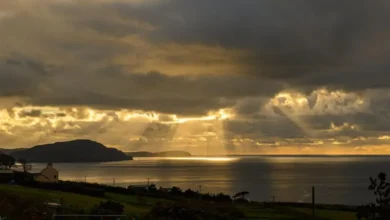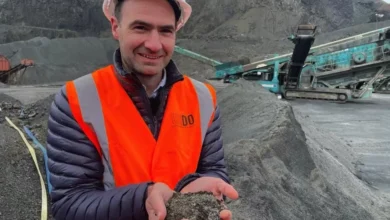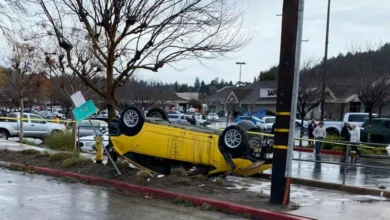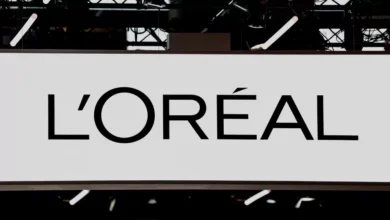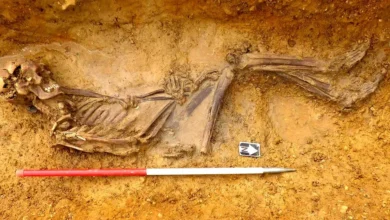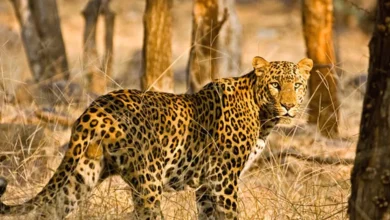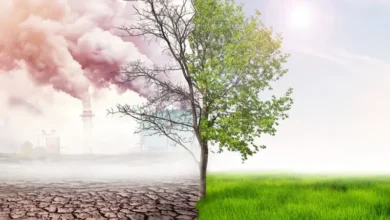The Australian climate protesters cast as extremists
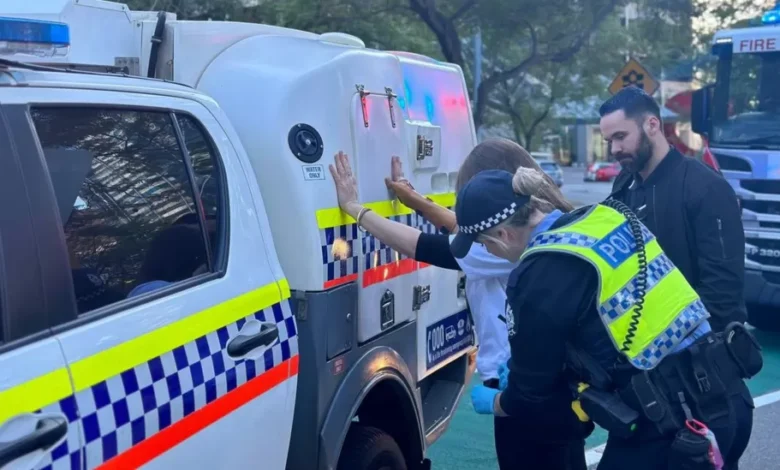
Emma Sangalli’s heart still stops every time she sees a police car.
“It’s a feeling in your gut like panic. Total panic.
“It’s hard not to believe that you’re a criminal, that you’re deserving of this,” the Australian climate activist says.
Last month, the 25-year-old had her home in Western Australia raided by counter-terrorism police.
Her alleged crime – helping to flood a global fossil fuel giant’s office with non-toxic gas.
Stench gas, which smells like rotten eggs, is let off in mines to alert workers of danger. In this case, it was used by protesters to empty the Perth headquarters of Woodside Energy, to highlight the climate crisis.
Australia’s largest oil and gas firm says the protests targeting its brand are “unlawful” activities by “extreme groups”.
But environmental campaigners say disruptive protest is key to their mission.
Meanwhile, lawyers warn that the response to climate activism in Australia has become “increasingly militarised”.
‘Unlawful acts’
Ms Sangalli says officers from Western Australia’s State Security Investigation Group (SSIG) – whose duties include counter-terrorism – searched her home for hours, looking for evidence of her involvement in the Woodside protest.
Despite facing no formal charges and not being present at the gas evacuation, she was forced to watch as her personal items were seized – including phones and laptops – and a male officer flicked through her diary.
“That was the most painful part,” she said.
“Violated is a good word for it. You’re rendered powerless.”
The activist has been involved with two climate protest groups – the global Extinction Rebellion, and the more local Disrupt Burrup Hub, which campaigns against fossil fuel projects on the state’s Burrup Peninsula.
Both groups follow a “direct action” strategy intended to end climate complacency, which means engaging in activities such as infiltrating fossil fuel conferences, blocking rush hour traffic, and superficially defacing artworks.

Several members of the group are now facing criminal charges over the Woodside protest, with the company alleging four of its employees suffered dizziness, breathing difficulties, rashes, and nausea.
“Woodside condemns unlawful acts that are intended to threaten, harm, intimidate or disrupt our employees,” the company said.
But Disrupt Burrup maintains their protest stunt was carried out safely and was a necessary action against one of Australia’s most powerful polluters.
Its members are challenging the charges in court.
Fighting the ‘petrostate’
Western Australia is a resource-rich state built on mining revenue, particularly iron ore, oil and gas.
Its industry is concentrated in the Pilbara, a desert area in the state’s far north. With an annual output of more than A$100bn (£52bn; $67bn), it powers the national economy and is home to global mining giants, including Rio Tinto and BHP.
Some of Australia’s most polluting projects are based there, including Woodside’s North West Shelf gas facility and its Scarborough development – a controversial offshore drilling venture which scientists say will jeopardise the nation’s climate targets.
Both projects have sparked fierce debate and renewed accusations that the gas lobby has an outsized influence over state authorities.
Access to ministers, timing of political donations and movement of mining executives into watchdogs, have all been cited as examples – including three former Woodside employees who chaired the advisory board of Australia’s offshore oil and gas regulator.
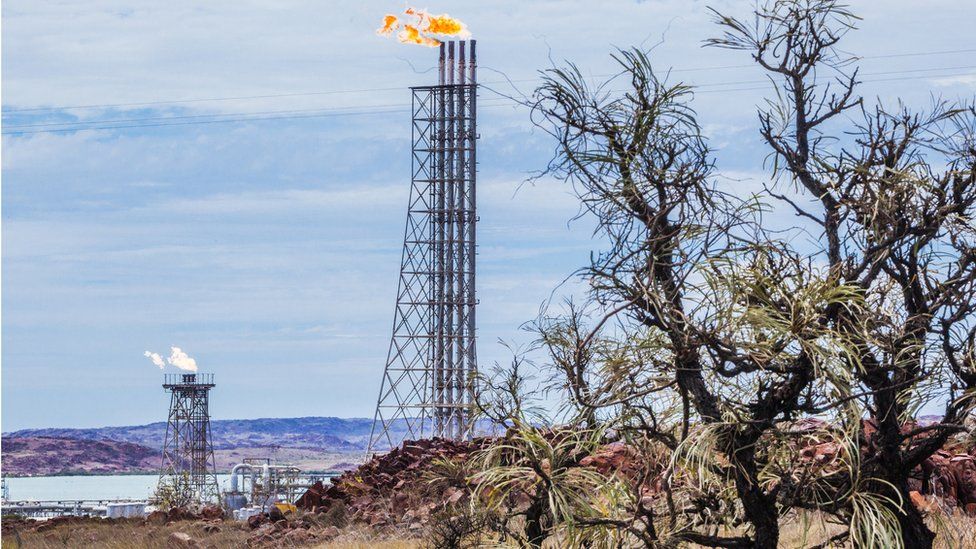
Gerard Mazza has led protests against Woodside’s Pilbara projects, due to their emissions and damage to local ancient Aboriginal rock art.
The 31-year-old’s home was recently raided by SSIG police for his alleged role in attempting to evacuate Woodside’s annual investors meeting in April, also using stench-gas.
He now faces charges of aggravated burglary, which carry a maximum 20-year sentence.
Mr Mazza argues Western Australia is a “petrostate” designed to “protect fossil fuel companies” due to the money they bring in.
“If it was really all about public safety, the state would be cracking down on Woodside executives making obscene wealth by endangering lives and ecosystems. Instead, they’re coming after us.”
The state government has routinely dismissed such claims, denying any influence. In response to the BBC’s questions, it said it is “committed to achieving net zero emissions by 2050”.
But Western Australia’s emissions continue to rise, while other states have recorded significant reductions over the past decade.
Climate activists cast as ‘extremists’
A dozen raids – including those on Mr Mazza and Ms Sangalli’s homes – have been carried out by the state’s counter-terrorism police against climate protesters this year.
The SSIG collaborates with federal intelligence agencies on matters of national security and is exempt from Freedom of Information laws, meaning its investigations remain secret.
Lawyers such as Julia Grix says politicians and prosecutors are framing climate protesters as a threat to public safety to justify heavy-handed policing.
The solicitor – who defends environmental activists – says her clients are increasingly being referred to as “extremists” in court documents.
“That sort of language is most commonly applied to organised crime of a very sophisticated kind, which I would associate with bikie (motorcycle) gangs, or terrorism,” Ms Grix said.
It’s a “demonisation strategy” used to justify “extreme measures never intended for regulating protests”, Australian legal scholar Luke McNamara says.
The right to protest has long been defended by Australia’s courts.
In 2017, a landmark High Court case ruled that Tasmania’s anti-protest laws were unconstitutional. And in 2020, a Queensland state court overturned suspended prison sentences against two activists who had blocked access to the major Adani coal mine.
David Mejia-Canales, a lawyer at the Human Rights Law Centre, an Australian rights group, says those protections are key to a functioning democracy.
“Protest takes many forms, sometimes disruptive. But that’s why it’s effective, because it disrupts the everyday to demand attention for a cause,” he said.
“As citizens of a democratic society, we should exercise a level of tolerance for disruption if the right to protest is going to have its full value.”
But Western Australia’s emergency services minister, Stephen Dawson, recently argued in parliament that the evacuation of Woodside’s offices could be viewed as “an act of terrorism” because “people’s health was put at risk by the material released”.
And some of Australia’s most prominent leaders – including former Prime Minister Scott Morrison – have called for demonstrations which obstruct critical infrastructure to be “outlawed”.
“The right to protest does not mean there is an unlimited licence to disrupt people’s lives,” he said in 2019, labelling environmental campaigners “anarchists”.
Australia’s broader crackdown
The court cases under way in Western Australia are not taking place in isolation.
They are part of a broader national crackdown which has seen Australian states criminalise disruptive protests through new laws, increased jail terms and penalties. This has sparked public outcry.
In May, after several Extinction Rebellion protests, the South Australia government introduced a A$50,000 maximum fine and three months jail for anyone “recklessly” obstructing public spaces, while laws passed in New South Wales last year created a two-year maximum prison sentence for acts disrupting major roads or facilities.
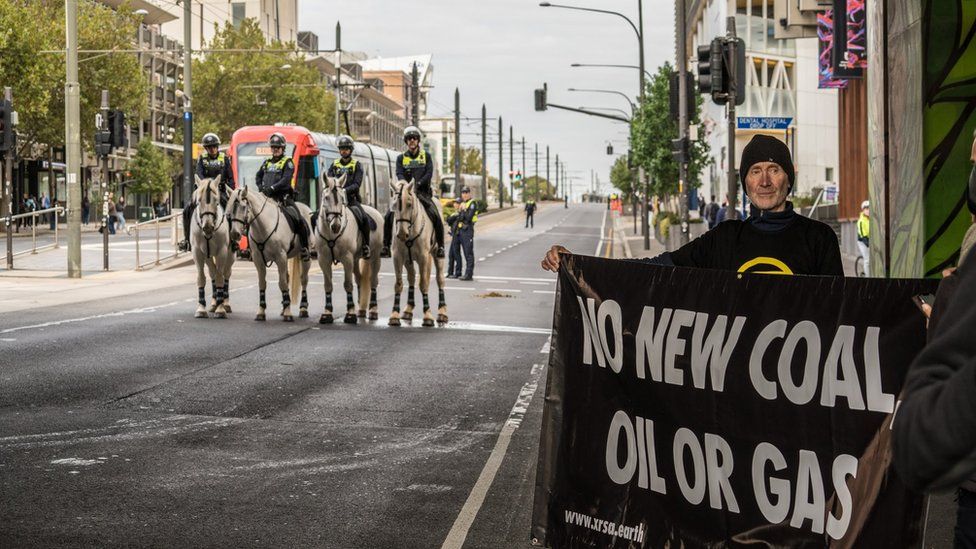
England, Wales and states across Canada and the US have also adopted similar laws aimed at blocking disruptive climate activism.
In Western Australia, climate protesters say they have been “disabled” by intimidating raids, strict bail conditions and orders which give authorities access to their devices and ban them from communicating with peers.
According to Ms Grix, these tools were originally intended to deal with gangs and drug dealers.
“To apply [that]… to climate defenders, who are protesting about environmental concerns, seems to be a massive overreach,” she says.
Prof McNamara agrees.
“What we see in these situations is the police reaching for whatever is at their disposal,” he told the BBC.
“Counterterrorism policing units and associated powers were never intended to be used against protesters.”
In the coming days, several court hearings will determine whether Mr Mazza and some of his peers could face prison.
But the 31-year-old says that while “climate and culture” remain under threat, he will “not be deterred” from protesting.

